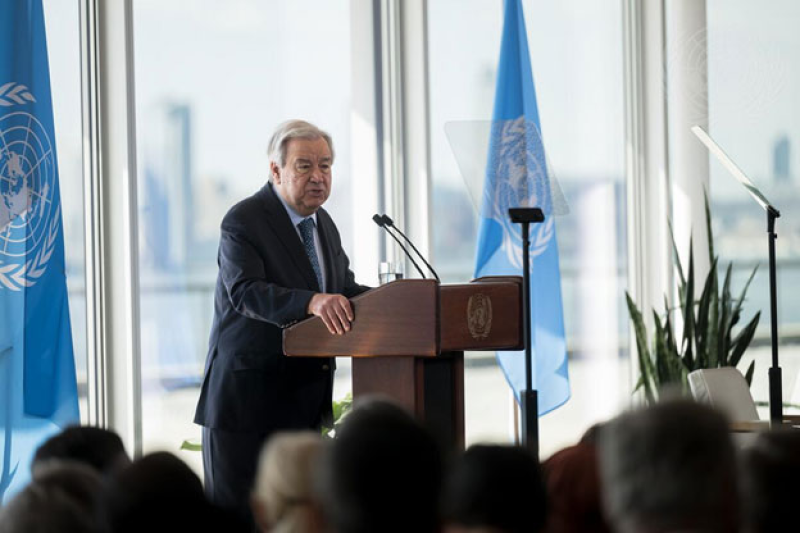- India Sees 9% Drop in Foreign Tourists as Bangladesh Visits Plunge |
- Dhaka Urges Restraint in Pakistan-Afghan War |
- Guterres Urges Action on Safe Migration Pact |
- OpenAI Raises $110B in Amazon-Led Funding |
- Puppet show enchants Children as Boi Mela comes alive on day 2 |
Clean Energy Gains Ground, But Climate Threats Persist

UN Secretary-General António Guterres delivers a special address on Climate Action “A Moment of Opportunity: Supercharging the New Energy Era”.
As a result of the worsening climate crisis, extreme weather patterns have disrupted nearly all aspects of human life around the world. With the impacts of fossil fuel reliance becoming more pronounced than ever before, the United Nations (UN) has implored governments and industries to adopt more sustainable, renewable energy sources.
On July 22, UN Secretary-General António Guterres delivered a speech titled A Moment of Opportunity: Supercharging the Clean Energy Age, in which he highlighted the urgency and importance of transitioning to renewable, clean energy. It followed the previous year’s special address, Moment of Truth, where he declared the fossil fuel era was nearing its end.
“The fossil fuel age is flailing and failing. We are in the dawn of a new energy era,” said Guterres. “The energy transition is unstoppable, but the transition is not yet fast enough or fair enough… That world is within reach, but it won’t happen on its own.”
According to Guterres, global financing for clean energy must be scaled up to support widespread adoption of renewables over fossil fuels. UN figures show funding needs to increase five-fold by 2030 to keep global temperature rise below the Paris Agreement’s 1.5°C target.
Over the past decade, only one in five clean energy dollars was allocated to emerging economies outside of China, making it difficult for much of the world to shift to renewables. Africa, despite possessing 60% of the world’s best solar resources, received just 2% of global clean energy investment.
Immediate investment is essential, as the ongoing climate crisis poses catastrophic threats to health, livelihoods, economies, and ecosystems. Africa’s Centers for Disease Control and Prevention (CDC) projects that by 2050, 14.5 million people may die from climate-related causes, equating to over 2 billion years of life lost. Economically, climate impacts could lead to $12.5 trillion in global losses by 2050.
Climate change is already a major driver of global food insecurity. Rising temperatures and extreme weather—such as floods, droughts, and wildfires—disrupt agri-food systems, reduce crop yields, and increase food prices, placing food out of reach for vulnerable populations.
On July 2, the United Nations Convention to Combat Desertification (UNCCD) released the Global Drought Hotspots report, which analyzed the impact of recent severe droughts. It found that over 90 million people in eastern and southern Africa are experiencing extreme hunger due to climate-induced droughts. Vulnerable groups—including women, children, the elderly, and those with chronic illnesses—face heightened risks such as cholera, malnutrition, and waterborne diseases.
“The report shows the deep and widespread impacts of drought in an interconnected world,” said Andrea Meza, UNCCD’s Deputy Executive Secretary. “We must urgently invest in sustainable land and water management, nature-based solutions, adapted crops, and integrated public policies—or face economic shocks, instability, and migration.”
The crisis also threatens education. According to UNESCO, children exposed to extreme heat could lose up to 1.5 years of schooling. In low- and middle-income countries—eight of which rank among the ten most climate-affected—schools are closed during 75% of extreme weather events, affecting around 5 million children per occurrence.
Countries in Asia and Central America are especially vulnerable. In China, heatwaves have reduced school attendance and test performance. In Brazil’s poorest regions, students lose about 1% of learning annually due to heat exposure.
Still, the Secretary-General remains optimistic. On July 22, the UN released its 2025 Energy Transition Report: Seizing the Moment of Opportunity, highlighting progress made since the Paris Agreement and key areas for future improvement.
Since 2010, renewable energy costs have fallen dramatically. Today, 90% of renewable sources are cheaper than fossil fuels. According to the International Renewable Energy Agency (IRENA), solar energy is now 41% cheaper than fossil-based energy, and wind energy is 53% cheaper.
In 2024, clean energy investments totaled $2 trillion—more than double the $800 billion spent on fossil fuels and a 70% increase from a decade ago.
Guterres urged governments to embed energy transition goals into national laws and ensure they protect workers and marginalized communities. The transition must maximize clean energy output to fully replace fossil systems.
The UN aims for universal access to clean energy and 100% renewable-powered tech firms by 2030.
“This is not just a shift in power. It is a shift in possibility,” Guterres said. “Of course, the fossil fuel lobby will try, and we know the lengths to which they will go. But I have never been more confident that they will fail—because we have passed the point of no return.”

